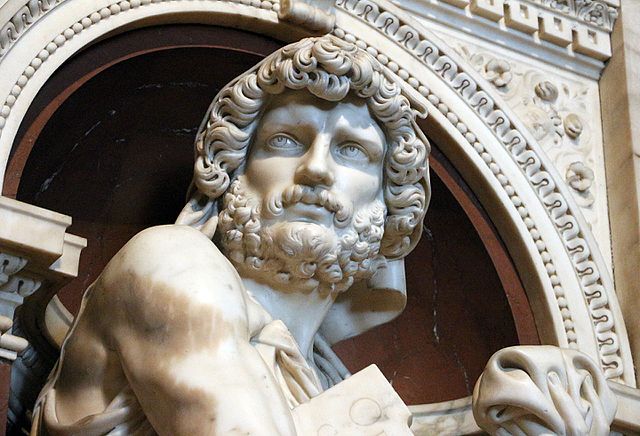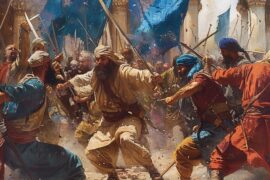The basic narrative the people of Israel tell ourselves about Bilaam casts him as a central antagonist in our story.
And while the Torah later references Bilaam’s wickedness in retrospect (Bamidbar 31:16 & D’varim 23:6), the surface level text (p’shat) of Parshat Balak appears to present him in a much more positive light. In fact, he repeatedly insists that he is only willing to do that which he is instructed to do by the Creator. He even refers to the Creator exclusively by the names known and used by the Hebrews.
Our sages reveal Bilaam to be a descendant of Lavan – who was himself the grandson of Avraham’s brother Naḥor. This branch of the ancient Hebrews produced most of Israel’s matriarchs and also possessed a strong cosmopolitan impulse that sought to achieve the Hebrew mission through living in the greatest cities amongst the most enlightened gentiles (leading Lavan to ultimately become known as an “Arami” rather than an “Ivri“).
Despite his personal loyalty to HaShem, Bilaam has fully integrated himself into the larger idolatrous world where he enjoys recognition and respect as a great spiritual figure. It actually appears that all of the pre-Israel Hebrews, including the entire Naḥor line, were “moderate” servants of the Creator who were relatively tolerant of idolatry. They neither imposed their beliefs on others nor challenged the immoral societal norms that typically accompanied idolatrous views and practices.
What set Avraham (and later the people of Israel) apart was that he insisted on the exclusivity of serving HaShem and launched a war against idolatry that brought him into direct conflict with the powerful Nimrod. It may have been precisely for this reason that Avraham – the destroyer of gods – was selected to be the progenitor of the nation of Israel. And it’s likely Israel’s aim to continue Avraham’s revolution that strikes fear into the hearts of the Moabites and Midianites. Upon stepping back onto the world stage after 40 years in the uninhabitable desert and after defeating the mighty kingdoms of Siḥon and Og, Israel is threatening the stability of the region.
It therefore makes sense that King Balak would seek to enlist the aid of a well known prophet of Hebrew origins to assist in repelling the fearsome Israelite hordes (according to our sages, Bilaam and his father had previously helped the Amorites penetrate otherwise impenetrable Moabite defenses). This sets the scene for a spiritual confrontation between Bilaam of the moderate Naḥor line and Israel of the radical Avraham line.
Bilaam demonstrates unsurpassed mastery over the more technical aspects of prophecy. His visions gazes far into the future and offer a profoundly detailed description of the events that he sees. His problem, however, is that he relates to his own prophetic skill as merely a handicraft and therefore fails to perceive the responsibility that his unique powers demands of him.
Our sages teach that Bilaam’s most pertinent qualities are “an evil eye, arrogance, and greed.” (Pirkei Avot 5:19)
But these traits may not be as clear cut as they initially appear.
An “evil eye” is essentially the tendency to find fault and to see flaws in others. Because it’s rare for any person or society to be completely good or bad, the attitude and outlook one adopts when evaluating others is often crucial.
One who tries to see the merits of others is said to have “a good eye” while a person who focuses on other people’s flaws is understood to have an “evil eye.” And that’s precisely the underlying mechanism that gave Bilaam’s curses their power – the efficacy of a curse consists in isolating and enhancing the negative aspects of that curse’s target.
But this trait isn’t only found in evildoers. It can sometimes even be found in righteous people – those of the g’vura (restrictive power) attribute whose impulse is to defend a culture, system, or social order from threats, and therefore have a tendency to focus on the negative traits of others.
Bilaam’s second character trait was arrogance, which clearly manifested itself in how he spoke to King Balak. But this trait shouldn’t be considered completely negative because in order to attain self-actualization and success in life, it’s often necessary that a person not underestimate himself. In Bilaam’s case, we see that his high opinion of himself isn’t exaggerated.
Our sages list greed as the third of Bilaam’s three primary qualities.
When Balak’s messengers come to enlist Bilaam’s help, he tells them that “even if Balak were to give me his house full of silver and gold, I couldn’t do anything, big or small, contrary to the command of HaShem my G-D.” (Bamidbar 22:18)
These words are often understood as hinting that Bilaam actually does want to receive from Balak a house full of silver and gold as payment for his services. But this seems somewhat petty within the context of Bilaam’s reputation for being one of the world’s greatest spiritual figures. Moreover, even after Bilaam demonstrates several times that he is unable to curse Israel, he repeats the same formulation (Bamidbar 24:13). At this point, we should no longer understand his “greed” as a demand for more generous material compensation.
We should therefore understand Bilaam’s greed not as greed for material wealth, but rather “spiritual greed” – an ambition to play a major role in historical events. The primary passion of exceptional individuals is a desire to influence the world and to significantly contribute to humanity’s development. This is one of the most compelling passions that a high caliber person with great potential can experience. Not a lust for money or even power but rather a need to influence history’s trajectory.
Such “greed” can actually be a very positive trait. It’s the force behind the creative impulse and only becomes problematic when it fails to discriminate between right and wrong. Controlling such passion therefore becomes a moral imperative. But Bilaam is unable to meet this challenge. He’s enslaved to his “greed” to such a degree that he loses his moral judgement.
King Balak expresses an exclusively geo-political understanding of the situation. A new player has emerged on the regional stage, demanding a share of the resources. It makes sense that the old guard would seek to repel the newcomer. Especially when that newcomer threatens the current social and political order. Balak, a political leader, is driven by realpolitik. For a king, this approach is legitimate.
But for Bilaam – a major prophet with exhaustive knowledge of Israel’s origins – this level of understanding is unacceptable. For him to adopt such a narrow and neutral geo-political approach is actually destructive. A prophet of his stature should have a broad perspective that takes Israel’s mission and destiny into consideration.
When the Creator asks Bilaam “What do these people want of you?” (Bamidbar 22:9), this isn’t meant rhetorically. It’s a question of how Bilaam understands the situation. When Balaam answers by essentially just repeating Balak’s words, this expresses that he prefers to limit his perspective to a surface-level geo-political understanding of events. From this moment on, his actions should be seen as criminal.
It’s important to note that Bilaam would later be executed by Pinḥas ben Elazar but Balak isn’t punished because his actions are actually appropriate to who he is. It’s Bilaam’s unwillingness to grasp the full essence and context of the events transpiring around him that essentially makes him a villain.
But why does Bilaam fail to understand the Creator’s special relationship with Israel and direct involvement in its national destiny? Hadn’t he seen the miracles performed for Israel forty years earlier?
Of course he did. But as a descendant of Naḥor and Lavan, he may not want to concede the correctness of Israel’s path.
While Bilaam could be seen as a “moderate” Hebrew, Israel is a nation of “radical” Hebrews intent on destabilizing the regional order (that benefits Bilaam). For generations, Bilaam’s family has championed a course of integration with an immoral world and respectful tolerance of idolatry, while slowly assimilating into the broader civilization. From this perspective, it becomes hard to see the revolutionary Avraham and his descendants as anything other than a dangerous splinter group further radicalized by Egyptian slavery and the charismatic leadership of Moshe.
This perspective prevents Bilaam from reading the map of history and seeing Israel and our national aspirations as genuine expressions of the Divine Will. From his perspective, the Divine Will must be apolitical and not take sides in the conflicts of nations. His approach is exclusively spiritualistic, focusing only on the specific instructions he receives from Above and feeling free to otherwise conduct himself according to the moral and cultural norms of his surroundings. This is the major flaw in Bilaam’s thinking because the Divine Will is revealed in earthly developments no less than in heavenly commandments.
By limiting his interaction with HaShem to the realm of “religion” for the individual, Bilaam fails to perceive the world around him as a source of Divine revelation.





